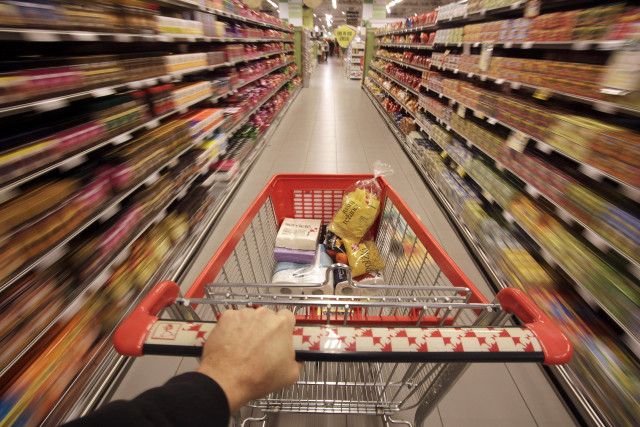Inflation falls to 8.5% in April
Reading eases on back of subdued demand in economy

Reading eases on back of subdued demand in economy. PHOTO: Reuters
For the third month in a row, the pace of increase in prices significantly slowed down to 8.5% in April, reported the Pakistan Bureau of Statistics (PBS) on Friday. It was one of the steepest reductions in inflation rate in a month as the reading eased two percentage points compared with March number of 10.5%.
The 8.5% inflation was the lowest in the past 10 months. Last time in July 2019, the inflation had been recorded at 8.4% - the level from where it had started rising and peaked at 14.6% in January this year.
Economic activities largely remained at a standstill last month due to partial lockdown imposed to stop the spread of Covid-19. Consumers have also adopted a risk-averse approach due to uncertain economic conditions and shrinking incomes.
The pace of inflation, including food, slowed down both in urban and rural areas. PBS calculates the inflation by monitoring prices of 356 commodities in 35 cities and 244 goods in 27 rural markets.
The food inflation in urban areas that stood at 13% in the preceding month, eased to 10.4% in April. In rural areas, the pace of food inflation slowed down from 15.5% in March to 12.9% last month.
However, prices of a majority of perishable food items increased compared to the preceding month. There was no increase in electricity prices on account of monthly fuel price adjustment for the second consecutive month in April. Instead, on a year-on-year basis, the PBS reported 5.9% reduction in electricity charges in April.
Core inflation, which is calculated by excluding food and energy goods, went down in urban and rural areas. The core inflation in urban areas slowed down from 7.4% to 6.4% and remained at 8.5% in rural areas, down from 9.4%.
Both the headline inflation and core inflation are now lower than the thrice-reduced key policy rate of 9%. The real interest rate, keeping in view the core inflation, is still positive by 2.6%.
A think tank, led by Finance Adviser Dr Abdul Hafeez Shaikh, urged the State Bank of Pakistan (SBP) this week to further reduce the interest rate. The government has set up the think tank to devise economic policies for the next fiscal year.
The Planning Commission has also recommended the Monetary and Fiscal Policies Coordination Board to adopt accommodative monetary and fiscal policies to boost the economy. The commission expects average inflation rate of 6% in the next fiscal year, which is lower than the predictions made by the International Monetary Fund (IMF) and the SBP.
The slowing inflation has not only provided room to cut the interest rate but should also be the reason for the adoption of credit expansion policies to boost consumer spending at a time of recession.
International financial institutions, the SBP and the Ministry of Finance have projected up to 1.6% negative economic growth for the current fiscal year. But the Planning Commission still sees positive growth momentum, provided the government does not enforce a complete lockdown.
PBS reported that prices of food and non-alcoholic beverages group, with 34.6% weight in the CPI basket, eased to 11.7% in April over a year ago. Perishable food item prices increased 11.2% last month compared with over 15% in the preceding month.
Alcoholic beverages and tobacco group inflation eased to 11.8% last month from 19% a month earlier.
Similarly, the housing, water, electricity, gas and fuels group – having one-fourth weight in the CPI basket, recorded an increase of only 5.1% last month. The transport group index rose only 3.44% last month.
However, prices of certain commodities surged because of the holy month-related consumption as provincial authorities and the Islamabad district administration could not ensure effective monitoring of prices.
Average inflation in 10 months (July-April) stood at 11.2%, which was broadly in line with the expectation of authorities. But the index is expected to slip further after the government reduced petroleum product prices by an average of 22% with effect from May 1.


















COMMENTS
Comments are moderated and generally will be posted if they are on-topic and not abusive.
For more information, please see our Comments FAQ